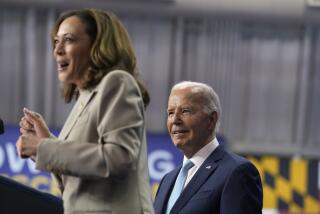Argentine supermarkets agree to price cuts to ease inflation
- Share via
BUENOS AIRES — Leading supermarkets in Argentina agreed Wednesday to trim prices temporarily by 5% on some basic foodstuffs amid government pressure to keep inflation in check before national elections scheduled in less than three weeks.
Inflation has emerged as the most contentious campaign issue here and perhaps the only one that could derail the widely anticipated runaway triumph of First Lady Cristina Fernandez de Kirchner in the Oct. 28 presidential election.
Consumer groups launched a boycott of tomatoes this week and have threatened similar strikes against other products if prices don’t come down.
The government estimates that prices this year will rise about 10%, but many independent economists say the real inflation rate is closer to 20%. The government has denied accusations that it has manipulated data used in calculating the official inflation rate.
“They’re wrong,” Fernandez responded last week when asked in Brazil about the contention of many experts that Argentine inflation was much higher than estimated.
Polls show Fernandez leading a fragmented opposition by 20 to 30 points, largely based on Argentina’s brisk growth since her husband, Nestor Kirchner, became president four years ago, when the economy was still reeling from the acute financial crisis of 2001-02.
Her lead is so overwhelming that Fernandez has hardly bothered to campaign: She has participated in no debates, granted few interviews and spent as much time wooing foreign investors from New York to Madrid as pressing the flesh.
In a nation with a history of hotly contested and animated elections, analysts say the Kirchners have succeeded in making this month’s vote appear as a natural transition from husband to wife.
Polls indicate support for the couple remains high even among the poor and working classes, those affected most deeply by rising prices.
The opposition has thus far been unable to turn widespread concern about inflation into an electoral weapon.
“The most vulnerable sectors and those of lowest incomes continue believing that the name Kirchner has the tools and magic to solve the problems,” said Jorge Giacobbe, an independent political analyst. “The government has skillfully managed the theme of prices and inflation as part of its electoral strategy.”
Kirchner has wielded price controls, export restrictions and other tactics in a populist assault on producers accused of gouging consumers. He has cast himself and his wife as defenders of average people.
The president unveiled the new price-cut deal Wednesday alongside representatives of major food chains, lauding executives’ willingness to impose a temporary 5% price reduction on certain products.
The “gesture,” Kirchner said, “has value in the pocket but also has value in the conscience.”
Consumer groups were skeptical, noting, for instance, that supermarket executives declined to name the products covered.
“Prices keep going up while officials continue posing for photographs with businessmen,” Pedro Bussetti, a consumer activist, told La Nacion newspaper.
Former economy minister and presidential contender Roberto Lavagna dismissed the price-cut deal as “a mess,” and cited “an acceleration of inflation to worrying levels,” with increasing poverty.
The temporary price cut on food-basket items is scheduled to last until Dec. 10, when Kirchner’s four-year term ends and his wife’s administration would begin.
--
patrick.mcdonnell @latimes.com
Andres D’Alessandro of The Times’ Buenos Aires Bureau contributed to this report.
More to Read
Sign up for Essential California
The most important California stories and recommendations in your inbox every morning.
You may occasionally receive promotional content from the Los Angeles Times.













